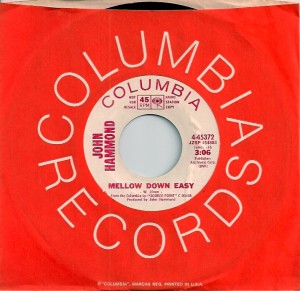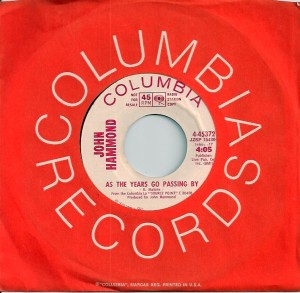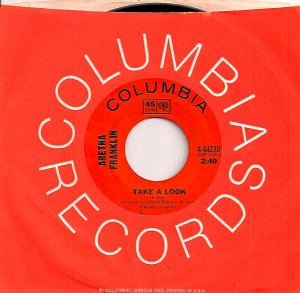
Listen: Take A Look / Aretha Franklin ArethaTakeALook.mp3
It’s well known that Aretha Franklin and her family’s musical beginnings were in Gospel. Yet in early 1960, she signed with John Hammond at Coumbia, a historically well respected A&R executive, but oddly a musical mismatch for Aretha. Despite initially scoring a few semi-hits on the Billboard Pop and RnB Singles charts, those initial results began a slow downward spiral of misjudged A&R song choices, bland jazz leaning arrangements, tiringly safe, and quite frankly, dull results. However, by the end of ’66, with little commercial success in those six years with Columbia, they threw her on the scrapheap, a policy that insensitively continued and in fact grew exponentially during my time there.
As the story goes, desperate for a sound of her own, she signed with Atlantic Records to work with producer Jerry Wexler. By ’67, Aretha Franklin issued her first Atlantic single, ‘I Never Loved a Man (The Way I Love You)’, a blues ballad that eliminated the safe musical stench Columbia forced her way, and introduced listeners to her original Gospel influences. Recorded in Muscle Shoals, Alabama, and produced by Wexler, the song became her true breakthrough single, reaching the Hot 100 Top 10 and holding the #1 spot for seven weeks on Billboard’s R&B Singles chart. In fact, the B-side, “Do Right Woman, Do Right Man”, charted on the R&B side as well, and again introduced a more Gospel element to Franklin’s developing sound. It also set a pattern for ballady bluesy B sides ahead.
Her next single, ‘Respect’, written and originally recorded by Otis Redding, instantly became her signature tune for life, reaching #1 on both the RnB and Pop charts—holding the top spot on the former for a then record eight weeks. In the next eighteen months, she released a number of singles we all know and love: ‘Baby I Love You’, ‘Chain of Fools’, ‘Since You’ve Been Gone’, ‘The House That Jack Built’ and ‘Think’, to name the cream of her early successful, now decidedly upbeat run.
Part of all that fun in the spotlight was, behind the curtain, Columbia’s attempt to ride Atlantic’s successful coat tails by releasing what sure did sound to me like records parallel with her now current sound – from their vaults. Finally, at least, Coumbia was doing some work on her, and doing it pretty well. With just about everyone from the label then now long gone, it’s impossible to ever know if it was astute planning or random desperation.
A first of these, ‘Take A Look’, was a good vault find, and to be fair, probably previously released as an LP track. It was during that summer (’67 – read past post on WMCR to understand) when the little local station, WMCR, was in the full-on groove of giving me all their non-easy listening singles during my regular Friday night visits to their studios. And I ended up loving it, as I did “Ain’t No Way’, B side of ‘Since You’ve Been Gone’ – both interestingly recorded and performed in an almost identical style.
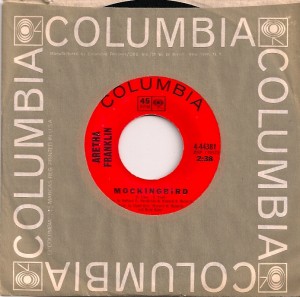
Listen: Mockingbird / Aretha Franklin ArethaMockingbird.mp3
Despite the play to piggy back onto Atlantic’s marketing spend toward making Aretha Franklin a household name, ‘Mockingbird’ was a great choice on Columbia’s part to compete with, yet actually compliment the groove her hits were in.
Written by Inez & Charlie Foxx, who had a Top 10 of their own with it in ’63, Aretha shined on ‘Mockingbird’. Had it been released at the time, things may have turned out differently. A great song, it did Carly Simon no harm when she took it to #4 in ’74.
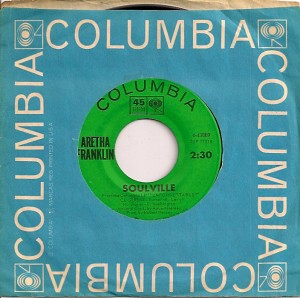
Listen: Soulville / Aretha Franklin ArethaSoulville.mp3
This was originally an A side Columbia issue (reaching #121) in ’64, then reissued in ’68, coinciding timewise with ‘Think’, where it dragged it’s way to a tired #83. But I admit, I picked up the original as a closeout (it’s pictured above) on it’s title alone. In fact it was to be my first Aretha Franklin single, price: 10¢.
Although Columbia tried issuing a few more 7′s, none charted and basically they retreated, tail between legs.
